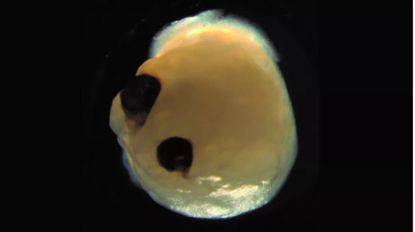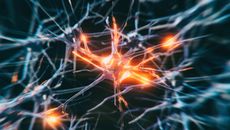Lab-made mini brain develops its own ‘eyes’
Researchers hope organoid development will prove useful for studying human brain

Scientists have grown mini brains with their own sets of “eyes” that can detect light in a groundbreaking new study.
“The human brain is one of the most ridiculously complex things nature has ever concocted, so to help us understand it better, scientists have been making miniature versions in the lab,” explains New Atlas.
These miniature versions of organs, called organoids, can then be used to study development, disease or the effects of drugs.
Subscribe to The Week
Escape your echo chamber. Get the facts behind the news, plus analysis from multiple perspectives.

Sign up for The Week's Free Newsletters
From our morning news briefing to a weekly Good News Newsletter, get the best of The Week delivered directly to your inbox.
From our morning news briefing to a weekly Good News Newsletter, get the best of The Week delivered directly to your inbox.
In the past, scientists have developed tiny beating hearts and even tear ducts that can cry, explains Live Science. Now, researchers from University Hospital Dusseldorf and elsewhere have grown brain organoids that boast structures similar to eyes called “optic cups” that give rise to the retina – the tissue that sits in the back of the eye and contains light-sensing cells.
The “eyes” respond to light by sending signals to the rest of the brain tissue, says New Scientist.
The researchers hope their study, published in the journal Cell Stem Cell, will prove useful for studying human brain development, particularly during embryonic stages, and related diseases.
“The human brain organoids formed optic cups, which appeared as early as 30 days and matured as visible structures within 50 days,” said a statement from Cell Press.
Sign up for Today's Best Articles in your inbox
A free daily email with the biggest news stories of the day – and the best features from TheWeek.com
It explains that this time frame is similar to the retinal development in human embryos, which means the research could benefit other developmental neurobiology experiments. Researchers generated 314 brain organoids, 72% of which formed optic cups, “showing that the method is reproducible”, says the statement.
“Our work highlights the remarkable ability of brain organoids to generate primitive sensory structures that are light sensitive and harbour cell types similar to those found in the body,” said Jay Gopalakrishnan, of University Hospital Dusseldorf, the lead author of the study.
“These organoids can help to study brain-eye interactions during embryo development, model congenital retinal disorders, and generate patient-specific retinal cell types for personalised drug testing and transplantation therapies.”
The research team hopes to develop strategies for keeping these structures viable on longer timescales for performing more in-depth research with huge potential.
However, New Atlas says that “while these brain organoids remain very rudimentary, if they continue to advance they might one day raise ethical concerns”.
It explains that previous studies have detected brainwaves in organoids similar to those of pre-term babies so there are questions about whether future development could lead to a form of self-awareness or even consciousness.
“Sensory input like vision might be a key ingredient for this,” says the site. “It’s an issue that scientists will need to keep an eye on.”
Create an account with the same email registered to your subscription to unlock access.
Chas Newkey-Burden has been part of The Week Digital team for more than a decade and a journalist for 25 years, starting out on the irreverent football weekly 90 Minutes, before moving to lifestyle magazines Loaded and Attitude. He was a columnist for The Big Issue and landed a world exclusive with David Beckham that became the weekly magazine’s bestselling issue. He now writes regularly for The Guardian, The Telegraph, The Independent, Metro, FourFourTwo and the i new site. He is also the author of a number of non-fiction books.
-
 23 weird and wonderful days of the year in 2023
23 weird and wonderful days of the year in 2023feature From stepping in puddles to hugging a plumber, there’s a day for everything…
By The Week Staff Published
-
 The mystery of the ‘Mad Gasser’ of Mattoon
The mystery of the ‘Mad Gasser’ of Mattoonfeature Investigators have puzzled over spate of unexplained illness in US town for almost 80 years
By Julia O'Driscoll Published
-
 Does life really flash before our eyes when we die?
Does life really flash before our eyes when we die?feature Researchers have found that some brain waves change pattern even after blood stops flowing to the brain
By The Week Staff Published
-
 ‘Britain is suffering from an ever-dwindling supply of compassion’
‘Britain is suffering from an ever-dwindling supply of compassion’Instant Opinion Your digest of analysis from the British and international press
By The best columns Published
-
 The breakthrough that reveals why humans are getting taller
The breakthrough that reveals why humans are getting tallerWhy Everyone’s Talking About Sensor in the brain tells the body that ‘we’re great here so grow quickly’, scientists say
By The Week Staff Published
-
 English-speaking ‘mystery woman’ found injured on rocks in Croatia
English-speaking ‘mystery woman’ found injured on rocks in Croatiafeature Police say she can’t remember her name or how she came to be on dangerous area of remote island
By The Week Staff Published
-
 ‘Ooh ’eck’: why northern accents are at risk of being wiped out
‘Ooh ’eck’: why northern accents are at risk of being wiped outfeature Scientists forecast that southern speech patterns will begin to take over
By The Week Staff Published
-
 VIDEO: ‘time-travelling’ illusion tricks the brain
VIDEO: ‘time-travelling’ illusion tricks the brainSpeed Read Rabbit Illusion shows how our perception of previous events can be altered
By The Week Staff Last updated


